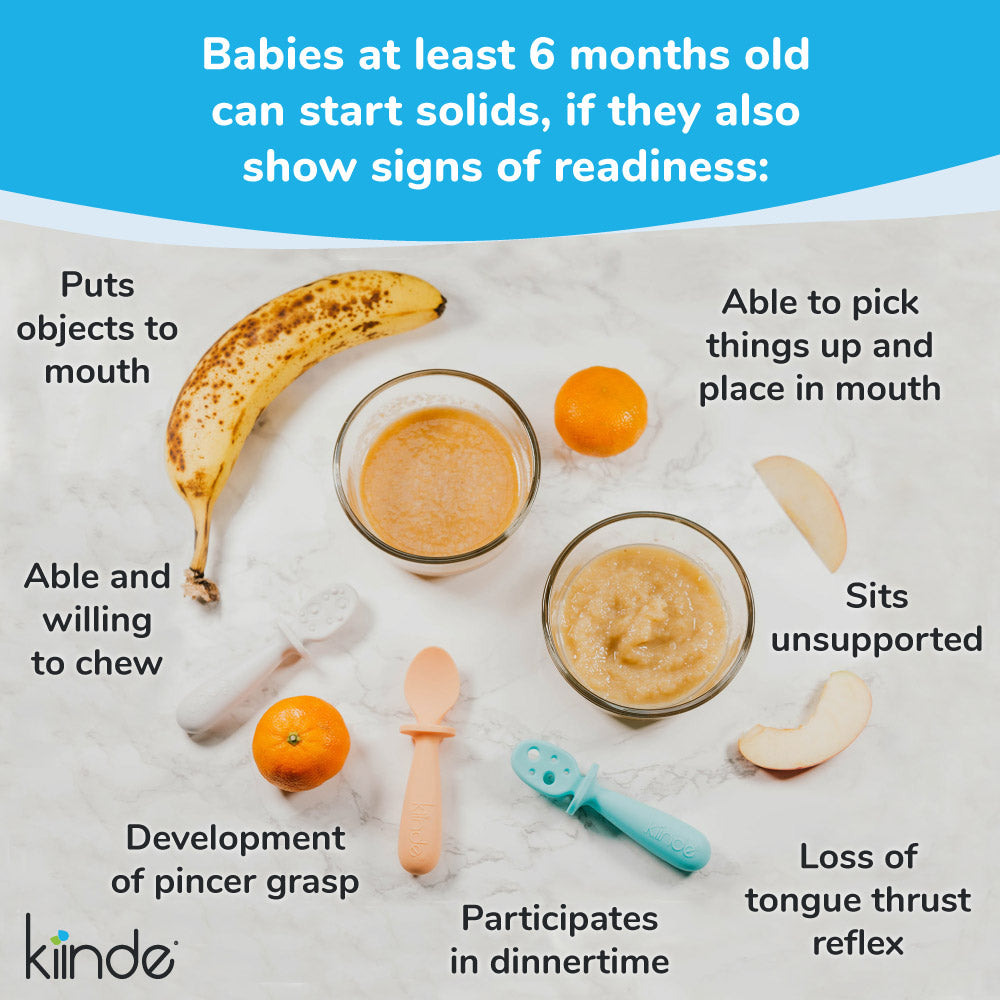
Is My Baby Ready For Solid Foods?
Share
“My baby is starting to show an interest in what I’m eating. What should I do now?”
The Kiinde lactation experts are with some tips for introducing solids!Is my baby ready for solids?
Before introducing solids, it is important that your baby is developmentally ready. These signs usually show up around six months of age and can be easily observed as your baby plays and interacts in their environment. The signs of readiness include:- Able to sit unsupported and in a highchair
- Development of the pincer grasp
- Able to move food to the back of their mouth and chew
- Eager and willing to participate in mealtimes
- Able to pick up and place things in their mouth
- Loss of tongue thrust reflex
Introducing Solids and breastfeeding
When introducing solids with your breastfed baby, it is important to understand that solids are meant to complement breastfeeding. Breastmilk or formula will still be the main source of nutrition for your baby until at least 12 months. Solids will be an additional food, but not a substitute for breastmilk or formula.
Start out with one feeding of solids, after breastfeeding, and gradually increase to solids three times a day by the time the baby is one year old. Always breastfeed or offer breastmilk or formula first and then offer solids. This will ensure that your baby is still getting 100% of the nutrition they need and will protect the mother’s supply. Follow your baby’s lead to decide when it is time to increase the amounts of solids.
If your baby is getting constipated, this may be a sign that the baby’s gut is not ready for solids, or that you are giving too many solids too soon. Foods like banana, rice, and bread can be binding and may also cause constipation. The best remedy is to back off solids for a few days to a week (breastmilk is a great laxative) or to decrease the amount offered. Fruits and vegetables that are high in fiber will help keep things moving as well. With the introduction of solids, you can also introduce water. Small sips can help your baby with chewing and prevent constipation. Water should never take the place of breastmilk or formula, and it is recommended to limit water intake to no more than 2 oz in 24 hours.
When and how much solid food should I offer?
When introducing solids, we suggest offering in the morning or during lunch. That way, if the baby has an allergic reaction or if the food causes the baby to have tummy troubles, it doesn’t happen in the middle of the night. We suggest starting with small amounts, no more than 1-1.5 oz at a time. As the baby gets used to solids and learns how to eat better, you can increase these amounts.

Ways to introduce solids
Now that your baby is ready for solids, how do you get started? There are two popular methods of introduction: parent-led feeding and baby-led weaning. Baby-led weaning is allowing the infant to feed themselves. The parents will provide portion-appropriate foods and allow the infant to utilize their pincer grasp to pick up the food and eat. A parent may slice soft or cooked fruits, vegetables or meat and allow the infant to eat on their own instead of pureeing and spoon-feeding.
When offering purees, parents can buy jarred pureed baby food or make it themselves, and then offer it to their baby with a baby-safe spoon. The Kiinde Foodii system is great for this. At dinner time, babies can have time to feed themselves, and parents also offer some mashed or pureed food with a spoon and bowl. It does not matter which method you decide to use or if you combine the methods. Most important is that your baby is meeting the developmental milestones recommended by your pediatrician.
Your baby is embarking on a new adventure of taste and textures, and you get to have a front-row seat! Have fun!
Best Baby Spoons for introducing solids
The best baby spoons that will grow with your family while keeping your baby comfortable, happy, and engaged! With a spoon for every age and stage, our Lil' Bites Soft Silicone Spoons will encourage your little one to learn new skills and achieve developmental milestones. Our set of three specially designed soft silicone spoons were developed to promote learning and growth. With the safety and security that you love and expect from Kiinde, these baby spoons are easy-to-clean and made from 100% food grade silicone spoons. Lil' Bites are dishwasher safe, can be boiled or sterilized, and are BPA free and phthalate free.

